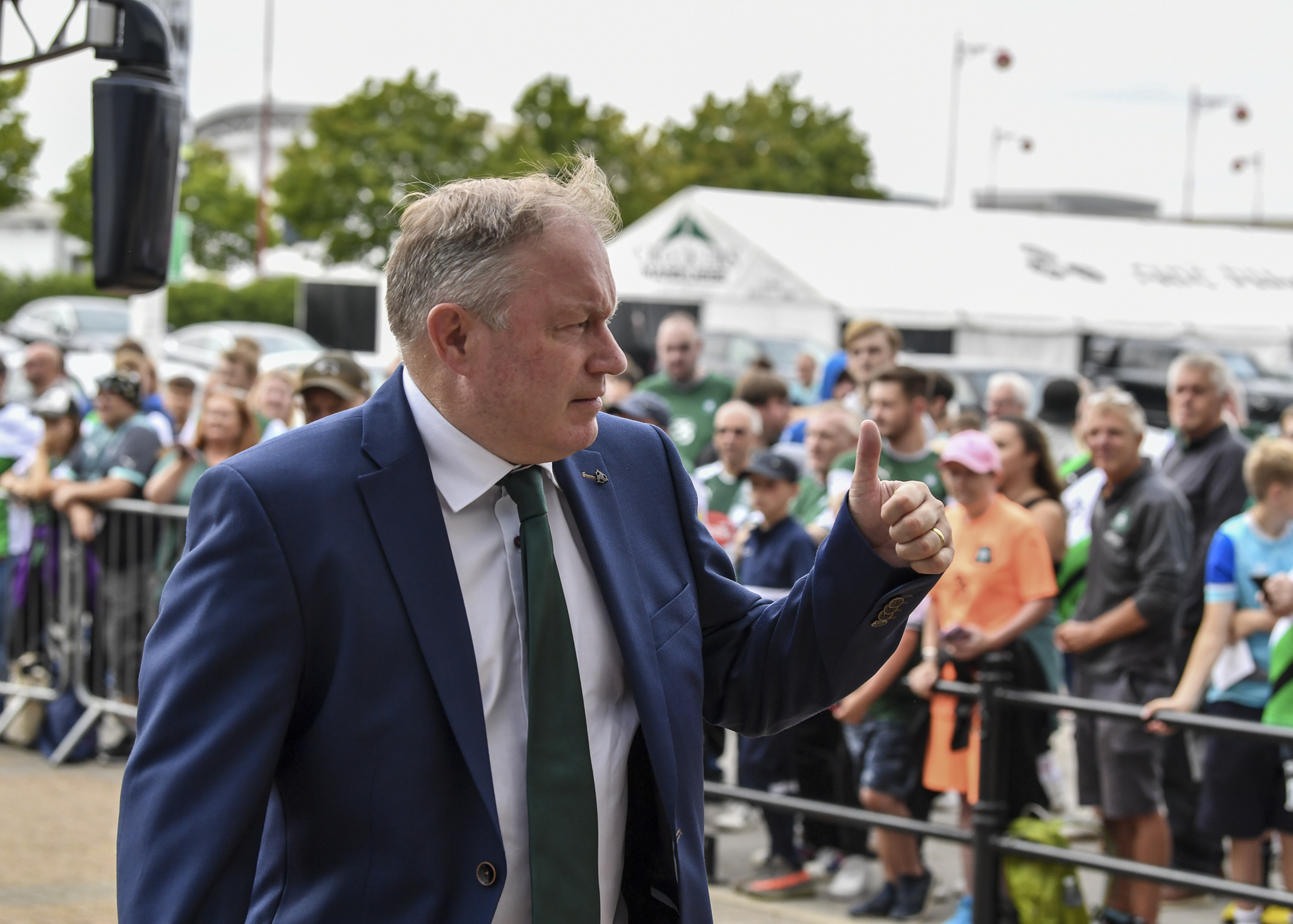Neil's Notes - EFL Youth Development Week
Argyle Director of Football Neil Dewsnip writes to supporters to update on several aspects involving the Argyle Academy, including targets, coaches, development and plans for the future...
As it is EFL Youth Development Week, it feels a very appropriate time to write to you again, with a focus on the positive things going on at Academy level at Argyle.
I would like to start by congratulating Darren Way and the Under-18s squad on their 3-0 victory over Cheltenham Town in the FA Youth Cup on Wednesday night.
I’ve been lucky enough to be involved in an FA Youth Cup winning team, when Everton beat Blackburn Rovers to win the competition in 1998. It is seen as the premier cup competition in youth football in our country. The games usually take place in clubs’ main stadiums, which adds a different flavour to it.
For the young players, at an early stage of their career, it is their FA Cup. That’s really exciting for them. Going through a few rounds breeds more positivity, around those players and within the club. It’s a win-win.
Our Academy sits very prominently within the overall strategy of the football club.
We have some very specific aims. For example, every season we look for an academy product to make a full first-team debut in the league, the FA Cup or the Carabao Cup. Will Jenkins Davies did that against Grimsby Town when he started the game, so that is one objective achieved for this season already.
It is not, though, just a box ticked. We would never play a player in a game such as that if we did not think they were ready. Will earned that opportunity, so congratulations to him.
If we can continue to do that every year, it is a massive sign that we have some talent coming through which the first-team manager can use. Ultimately, that is what the Academy is about. It is a production line of first-team players. We don’t want to do that once in a blue moon - we want to do it every single season.
Another target of note is that every time our first team puts in a teamsheet, we are striving for there to be a minimum of four Academy products on that teamsheet. We are averaging over that so far this season, which is great.
These are challenges that I, as the Director of Football, lay at the feet of Academy Manager Phil Stokes and his team. We continually discuss who those players may be to achieve our targets. I believe Phil is doing a superb job, and the facts are there to back that up.
We often talk about recruitment of young players, but recruitment of our members of Academy staff is incredibly important as well.
Our staff are hand-picked. Phil, Kevin Nancekivell and I spend lots of time discussing potential candidates. Our players are so valuable to us; we don’t want the wrong kind of coach being involved, because the players wouldn’t develop in the right way.
Plymouth Argyle has to be a safe environment for young people to play and enjoy their football, and for them to progress and develop as talents and people.
Academy football staff are more highly qualified than ever they were. They are specialists; their qualifications are around young player development as opposed to just general football. There are more players involved, so there are more coaches involved.
We scour grassroots football in Devon and Cornwall, looking for the right people. We feel as though we want to stay with local coaches because we think that adds to the Argyle DNA.
We are looking for people who can show their dedication, not only with formal qualifications, which we support the attainment of, but also in-house workshops of Continuing Professional Development. A major part of my role is to lead on that.
I recently did a session at MarJon, with all our coaches from Under-9s to Under-12s. Steven Schumacher and Mark Hughes came along and couldn’t resist joining in. That’s a sign of how motivated the staff are at Argyle to become better coaches.
I think a coach should be able to coach the youngest ages, as well as the first team. Obviously, all coaches will have specialist areas, but they should be able to contribute across the spectrum.
I am a big believer in developing technical ability. That is developing skills like juggling, receiving techniques, turning, dribbling and so on. We have a curriculum that our coaches deliver with those technical skills at its core. I believe that is a massive reason why our players, of all ages, are improving technically.
We don’t want our coaches to be identical; we don’t want to produce robots. It is good for players, as they work through the system, to work with a variety of coaches.
We do, though, want them to buy into the principles that Plymouth Argyle stand for. We are, by definition, a possession-based football club. We want players to be in possession of the ball. Steven, this season, has the first team playing predominantly with a 3-4-3 system. Last year, he played 3-5-2.
We don’t insist that players at young ages play in a certain shape, but we want them to experience similar methodology to the first team. When they get to the Under-18 team, we do want them to play in a similar system to our first team. If, for example, we have a situation like Will Jenkins Davies and Caleb Roberts featuring for the first team at Grimsby, they already have an understanding of their roles and positions within the team.
When I was a young player of 14 – at Liverpool, can you believe? – that was the age that you could become what they called an associate schoolboy. That was the first signpost on your journey. Now, the first registration is at nine years of age.
As an ex-PE teacher, I would love schools to play in the abundance that they once did when I was a schoolboy, in the 1970s. The reality is that school teams play far fewer games now.
Academies now take up that slack. Young players are provided with good educational provisions in football from a very young age.
Children of that age are not told: ‘You will become a professional footballer.’ You could argue that that would be an overly optimistic statement to make to them at 14 or 15, too. At that point, the focus is simply on making them better. It is only when they go full-time into a youth programme that the aim of our Academy would be for players to achieve professional contracts.
That does not have to be at Plymouth Argyle, by the way. Obviously, we want to produce an abundance of talented players to augment our first team, but a player going to play for another club would still be a success for our Academy.
A big change in recent years, in academies around the country, has been the improvement in facilities. We are working very hard at Argyle to update ours.
Our CEO Andrew Parkinson, Phil Stokes and I are in constant dialogue and working very hard to improve our facilities to match others around the country., There are moves afoot to do so. It is an ongoing discussion at the highest levels of our football club.
Because of our geography, our fixtures list is somewhat challenged. When I was at Everton, we could play around a dozen clubs who were within half an hour’s drive. Our young players at Argyle have to travel immense distances to get a sufficient quality of fixture.
We are trying to develop a programme that allows our youngsters to play against Category One academy sides on a regular basis. We are trying to be creative about that; perhaps we meet them halfway and play at a neutral venue. It is all being discussed.
Our programme is very good, but if we want to maintain momentum, especially from around age 13 upwards, we have to find a way of improving our fixture list to regularly play those teams.
In previous jobs, when 100% of my time was spent of developing young players, it was the best job in the world. The excitement, the buzz you get working with a youngster who runs out for the first team – there is no better feeling.
Sometimes, like Michael Cooper has, you can get in the team early, and stay in the team. Sometimes you take the Adam Randell route, which is to get some first-team experience here, then go out loan as you are not quite ready, but then come back and stay in the team. No two journeys are the same.
That is what is so fascinating about being involved in young player development. We are tasked with looking at our best young players and working out what their pathway will look like. Some are easier than others.
Wayne Rooney’s was probably the easiest plan I and the rest of the staff at Everton ever put together, because he was so obviously talented.
If I went to watch our Under-9s next week, and anyone said to me: “Neil, which of them is going to make it?” I wouldn’t have a clue. I could tell you who I liked, who I thought had a chance at being in the programme in three or four years’ time, but there are so many variables to factor in that is impossible to truly predict.
It actually gets easier as they get older, as they are getting closer to the final goal, which is to become a professional. And then, another journey starts. It might be the end for the Academy’s input to a player, but it is just the beginning for the first team. It never ends.
Neil Dewsnip is sponsored by Argyle USA



